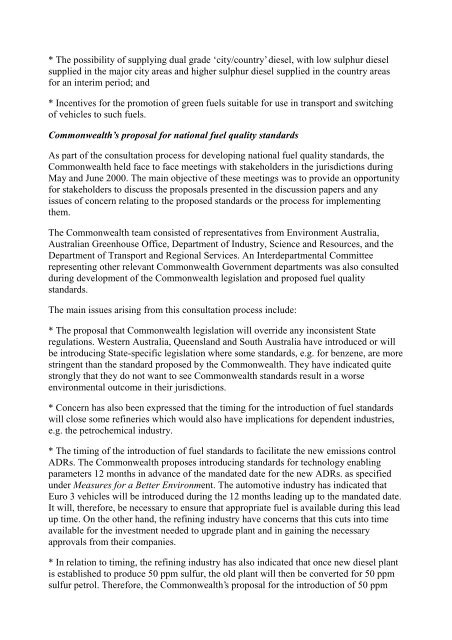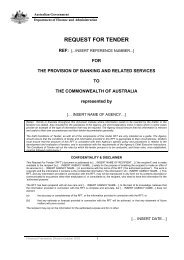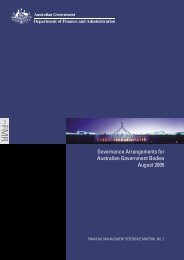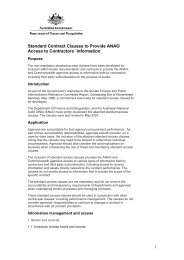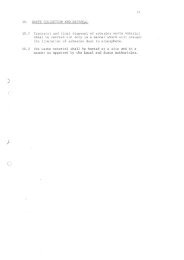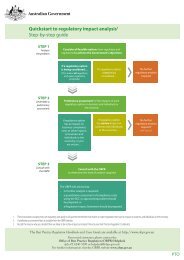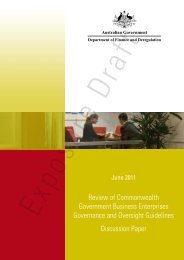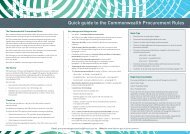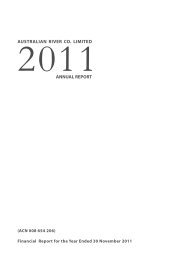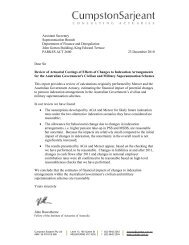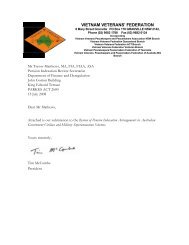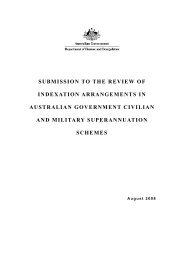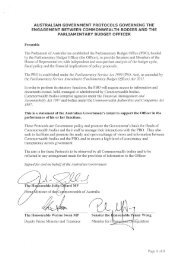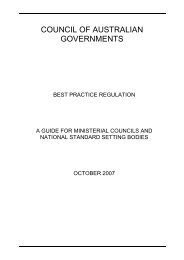National Fuel Quality Standards Regulation Impact Statement 1 ...
National Fuel Quality Standards Regulation Impact Statement 1 ...
National Fuel Quality Standards Regulation Impact Statement 1 ...
Create successful ePaper yourself
Turn your PDF publications into a flip-book with our unique Google optimized e-Paper software.
* The possibility of supplying dual grade ‘city/country’ diesel, with low sulphur diesel<br />
supplied in the major city areas and higher sulphur diesel supplied in the country areas<br />
for an interim period; and<br />
* Incentives for the promotion of green fuels suitable for use in transport and switching<br />
of vehicles to such fuels.<br />
Commonwealth’s proposal for national fuel quality standards<br />
As part of the consultation process for developing national fuel quality standards, the<br />
Commonwealth held face to face meetings with stakeholders in the jurisdictions during<br />
May and June 2000. The main objective of these meetings was to provide an opportunity<br />
for stakeholders to discuss the proposals presented in the discussion papers and any<br />
issues of concern relating to the proposed standards or the process for implementing<br />
them.<br />
The Commonwealth team consisted of representatives from Environment Australia,<br />
Australian Greenhouse Office, Department of Industry, Science and Resources, and the<br />
Department of Transport and Regional Services. An Interdepartmental Committee<br />
representing other relevant Commonwealth Government departments was also consulted<br />
during development of the Commonwealth legislation and proposed fuel quality<br />
standards.<br />
The main issues arising from this consultation process include:<br />
* The proposal that Commonwealth legislation will override any inconsistent State<br />
regulations. Western Australia, Queensland and South Australia have introduced or will<br />
be introducing State-specific legislation where some standards, e.g. for benzene, are more<br />
stringent than the standard proposed by the Commonwealth. They have indicated quite<br />
strongly that they do not want to see Commonwealth standards result in a worse<br />
environmental outcome in their jurisdictions.<br />
* Concern has also been expressed that the timing for the introduction of fuel standards<br />
will close some refineries which would also have implications for dependent industries,<br />
e.g. the petrochemical industry.<br />
* The timing of the introduction of fuel standards to facilitate the new emissions control<br />
ADRs. The Commonwealth proposes introducing standards for technology enabling<br />
parameters 12 months in advance of the mandated date for the new ADRs. as specified<br />
under Measures for a Better Environment. The automotive industry has indicated that<br />
Euro 3 vehicles will be introduced during the 12 months leading up to the mandated date.<br />
It will, therefore, be necessary to ensure that appropriate fuel is available during this lead<br />
up time. On the other hand, the refining industry have concerns that this cuts into time<br />
available for the investment needed to upgrade plant and in gaining the necessary<br />
approvals from their companies.<br />
* In relation to timing, the refining industry has also indicated that once new diesel plant<br />
is established to produce 50 ppm sulfur, the old plant will then be converted for 50 ppm<br />
sulfur petrol. Therefore, the Commonwealth’s proposal for the introduction of 50 ppm


